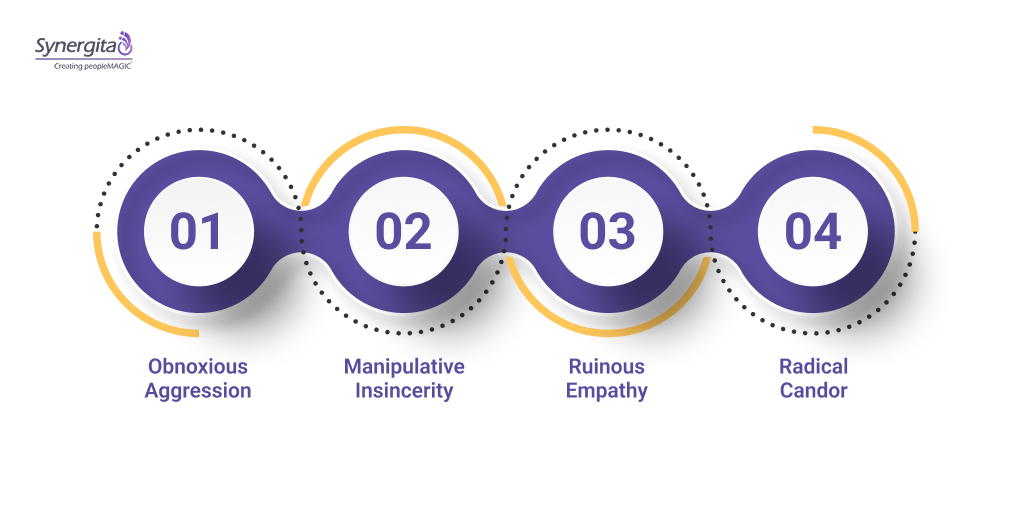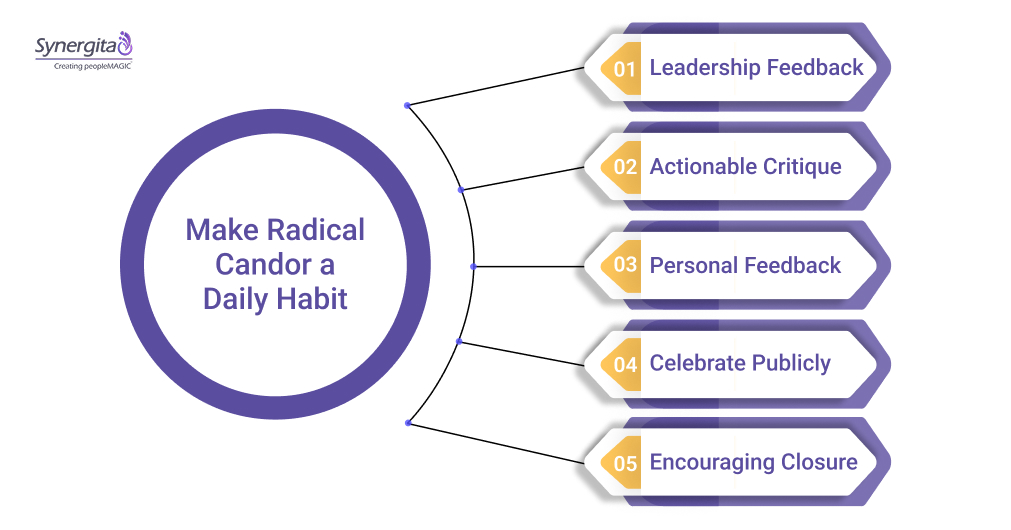Nearly one-third of employees wait over three months for performance feedback from managers. At the same time, 96% want feedback more often and immediately when they do their best work.
Understanding the meaning of Radical Candor, which helps give honest, actionable feedback with genuine appreciation, is required to close this gap.
Without clear, timely communication, small misunderstandings can turn into significant performance problems, causing teams to lose focus and motivation. In this guide, you’ll see how Radical Candor and OKR software help you build a better feedback culture and boost your team’s success.
Key Takeaways
- Delayed feedback reduces team motivation and performance, causing disengagement.
- Radical Candor combines honest feedback with genuine care to drive growth and trust.
- Kim Scott’s model identifies four feedback styles, with Radical Candor being most effective.
- Making feedback a daily habit fosters continuous improvement and a strong team culture.
- OKR software integrates feedback with goal tracking, enhancing alignment and accountability.
- Consistent, honest feedback combined with clear goal tracking drives continuous team growth.
- Integrating real-time feedback with objectives helps maintain alignment and boosts accountability.
Missed Feedback Means Missed Growth
Consider this: Your team puts in the effort, yet months may pass without clear feedback on what’s going well or where improvements are needed. This uncertainty can cause disengagement. Timely, meaningful feedback is more than a communication tool; it’s essential for your team’s progress and fulfillment.
So, how can leaders close this gap? That’s where Radical Candor comes in. By caring personally and speaking honestly about what’s working and what needs improvement, you make feedback a powerful tool for trust, growth, and shared success.
Radical Candor: What It Is, and Why It Matters for Your Team
Radical Candor is about giving honest, direct feedback, always paired with sincere personal care. It means sharing both the positives and the areas for improvement, but in a way that affirms the team’s potential and worth. This caring, candid approach builds trust, keeps everyone moving in the same direction, and turns feedback into a springboard for actual team growth.

High-Impact Feedback: The Two Principles Behind Radical Candor
Build radical candor into every conversation:
| Principle | What You Do | Impact |
| Care Personally | Show empathy; support your team’s personal growth | Build trust and safety |
| Challenge Directly | Address issues openly; set clear expectations | Drive progress and alignment |
Effective feedback means you focus on behavior, not personality. Actionable comments help people grow—a clear “what” and “why” move the team forward.
How the Radical Candor Model Drives Real Change

When giving feedback, it’s important to understand the different ways it can be delivered. Kim Scott’s Radical Candor model highlights four distinct approaches, each shaping your team’s trust, motivation, and overall growth differently. Recognizing these paths helps leaders choose the feedback style that truly supports development and strong relationships.
1. Obnoxious Aggression
Obnoxious Aggression happens when you challenge your team strongly but don’t show genuine care. Your feedback may be blunt or harsh, which might get quick compliance. But over time, you damage relationships and erode trust.
As a result, your team members may start to avoid sharing openly or switch off emotionally, which hurts collaboration and innovation.
2. Manipulative Insincerity
Manipulative insincerity occurs when you avoid honesty or care, often by sugarcoating or withholding feedback altogether. This creates confusion about expectations and leaves problems unresolved.
Without clear direction, your team loses focus and momentum, and trust begins to fracture behind the scenes.
3. Ruinous Empathy
You deeply care about your team but hesitate to give tough feedback. You soften or avoid difficult conversations to protect feelings, but this harms growth. Problems linger unnoticed, and mistakes repeat.
As a result, your team misses opportunities to improve. Over time, this can create frustration and stagnation for everyone involved.
4. Radical Candor
This is the ideal balance reflecting the true radical candor meaning, challenging directly while caring personally. You give honest, actionable feedback that helps your team know what’s working and what needs improvement.
By sharing feedback with respect and support, you build stronger relationships and a culture of continuous growth. Your team feels valued and safe to engage openly.
Aim for the radical candor quadrant. Speak up about what matters, always, to help people improve. Highlight actions, not faults, and express belief in your team’s capacity to get better.
Make Radical Candor a Daily Habit

You shape your team’s feedback culture. Here’s how to build radical candor into your routine:
- Request feedback on your leadership. Show everyone that feedback goes both ways.
- Link critique to action. Every point comes with a clear suggested step.
- Give feedback in person, one-on-one, especially for improvement conversations.
- Publicly celebrate achievements to build morale. Offer growth comments in private for dignity and motivation.
- Always close with encouragement and a belief in your team member’s potential.
When you give honest, kind feedback, you set a standard your team will follow.
The Listening Advantage: Feedback Flows Both Ways
Radical candor requires active listening, not just speaking. Give your team regular check-ins, pulse surveys, and opportunities to share their views. Act on what you hear, and recognize team contributions. A listening culture makes it safe to surface issues early and supports continuous improvement.
When Leaders Commit, Culture Changes
Leaders who model radical candor foster accountability and openness. Host frequent one-on-ones, share challenges transparently, and show everyone that tough feedback is an investment in their growth, not a personal attack. Leadership buy-in breaks down barriers and reinforces a winning feedback culture.
Why OKR Software Matters
OKR software integrates feedback and accountability into daily work, rather than limiting them to occasional tasks. By linking radical candor with clear goals and real-time tracking, it helps managers and teams give timely, focused feedback and stay aligned. Dashboards and automated reminders increase transparency, enabling teams to address issues, celebrate wins, and improve continuously.
Combining radical candor with OKR technology strengthens your feedback culture and drives better performance, growth, and alignment. Embedding these tools into workflows creates an environment of clear communication and shared goals for lasting success.
How Synergita Supports Radical Candor in Action
Bringing Radical Candor principles to life requires the right tools to make honest, caring feedback part of your team’s daily routine. Synergita provides these tools, helping teams embed Radical Candor at every step by enabling timely feedback, clear goal tracking, and continuous development across your organization:
| Synergita Feature | Radical Candor Principle Supported | Benefit to Teams |
| Real-time feedback system | Care Personally & Challenge Directly | Enables timely, honest conversations |
| Automated OKR tracking | Challenge Directly | Clear progress & alignment |
| 1:1 Meeting Templates | Care Personally | Supports meaningful growth talks |
| Confidential reviews | Care Personally | Safe space for candor |
| Pulse surveys | Care Personally | Instant team sentiment checks |
The Vedanta Example: Radical Candor in Action
Vedanta overcame the challenge of managing 14 separate business units, each with its HR system and unclear communication, by adopting the Synergita OKR solution. Through regular check-ins and transparent reviews, Synergita brought consistency and clarity to both feedback and goal-setting.
Crucially, the platform enabled leaders to practice Radical Candor by making honest, caring feedback part of daily work. Managers could provide timely support, while employees tracked progress toward shared goals. This shift fostered open communication and continuous improvement, resulting in stronger morale, better teamwork, and real progress across the company.
Synergita: Align Strategy with Radical Candor
Synergita’s performance management system supports your transformation by providing real-time feedback, automated OKR tracking, and seamless integrations that embed radical candor into your everyday workflows. Managers use feedback to create growth opportunities, while teams gain clarity on goals and measurable progress, boosting engagement and alignment across the organization.
Are you ready to move beyond surface solutions and build a thriving culture of feedback and growth? Experience Synergita OKR free for 7 days and discover firsthand how real-time feedback and goal alignment can transform your team’s impact.
You can also explore our resources to see how other successful startups have scaled through strategic planning and alignment. Your future self—and your team—will thank you.

FAQs
1. Why does delayed feedback hurt team performance?
Without timely feedback, employees lose clarity on expectations and motivation, leading to disengagement and missed growth opportunities.
2. How can OKR software enhance the practice of Radical Candor?
OKR software integrates real-time goal tracking and feedback reminders, making it easier to give timely, focused, and actionable feedback that aligns with clear objectives.
3. How should leaders use Radical Candor when giving tough feedback?
Leaders should be direct and honest while showing empathy, focusing on specific behaviors, and offering clear steps for improvement without attacking personality.
4. Can Radical Candor help in building a culture of continuous feedback?
Yes, Radical Candor encourages ongoing conversations and two-way listening, which cultivates a safe environment for learning, accountability, and growth.
5. What role do tools like pulse surveys and 1:1 meeting templates play in Radical Candor?
These tools facilitate regular check-ins and create safe spaces for honest dialogue, helping leaders and teams maintain open communication and build trust.

